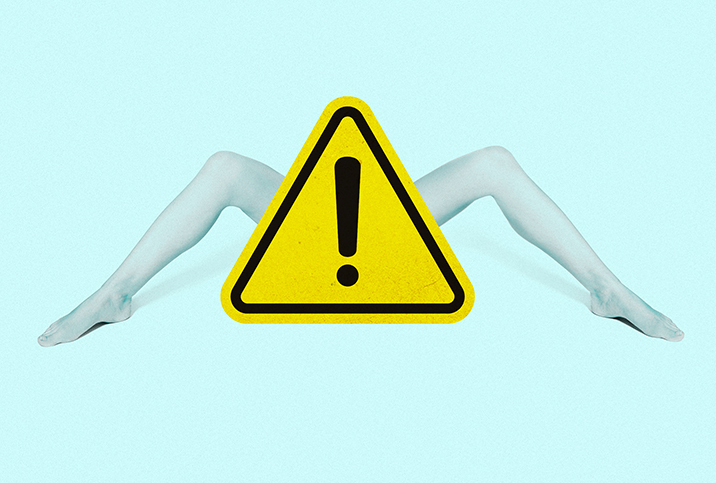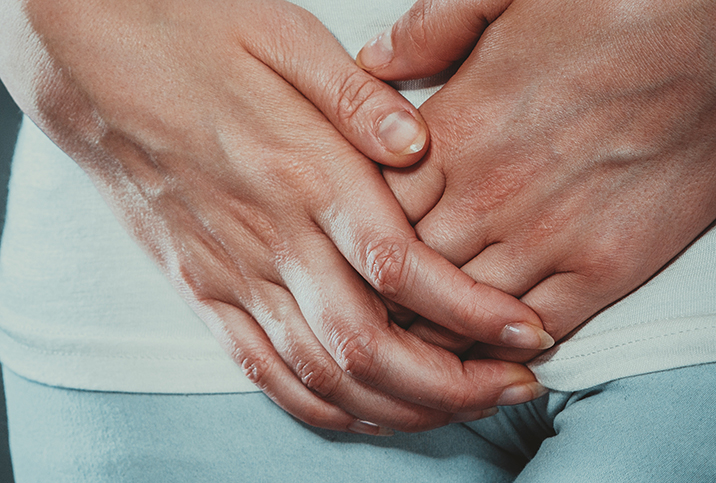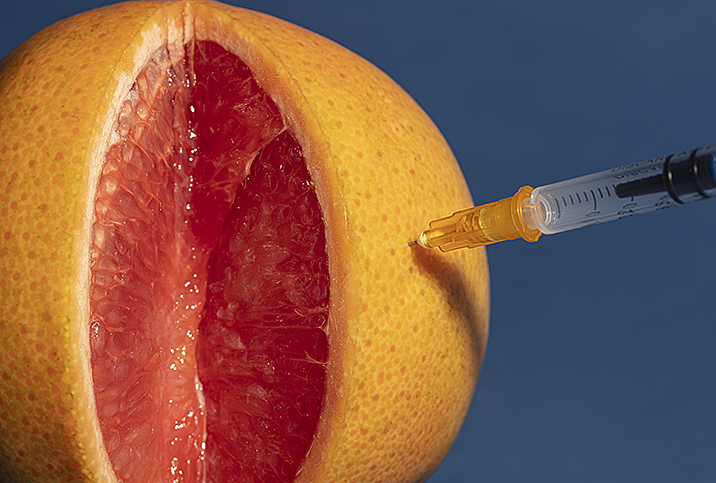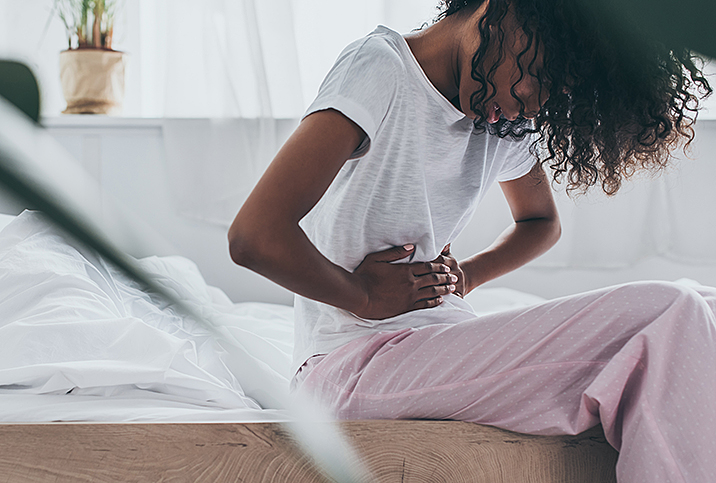A Dating Guide for Vulvodynia

We all want to date freely and safely, but for some of us, that dream is just unrealistic. Dating gets complicated when your genitals refuse to cooperate, and instead corrupt sensuality with pain and discomfort.
Vulvodynia is one of several gynecological conditions that turn dating new people into a maze of complications. The condition is characterized by chronic vulvar pain without an identifiable cause. Experiences vary dramatically, with some patients feeling pain and discomfort in a singular area and others reporting pain in multiple areas.
Up to an estimated 16 percent of women in the U.S. will have vulvodynia at some point in their lifetime, according to the National Vulvodynia Association. Typically, the onset of the condition occurs between ages 18 and 25.
More broadly, painful penetrative intercourse—which is likely to encompass vulvodynia along with other gynecological conditions, such as vaginismus—is terrifyingly prevalent. A British study published in 2017 revealed that 1 in 10 women experiences painful sex.
Many navigate the dating scene with genitals that refuse to cooperate, an experience not helped by woefully inadequate sex education. Even if the world continues to ignore it, leaving prospective dates clueless, there are many paths to romantic fulfillment while living with vulvodynia.
What is vulvodynia?
Upon disclosing your vulvodynia to a partner, their first response might be a request for a pronunciation lesson—but the condition is far more frustrating to deal with than its pretty name implies.
Research into the condition remains limited, but we know it can be triggered by hormonal and genetic factors, as well as injury or irritation to the nerves surrounding the vulva. There are also some comorbidities that make it more likely to occur, such as irritable bowel syndrome, musculoskeletal problems and lichen sclerosus.
"One may feel a burning, stinging, itching, irritating or a raw feeling in the vulval area. The vulva is the part of the body that extends from the pubic mound down to the top of the anus and includes the outer and inner lips that surround the vagina," explained OB-GYN and co-author of "Living PCOS Free" Nitu Bajekal, M.D. "Even though it's the leading cause of painful sex among women who haven't gone through menopause, it's difficult to know how widespread vulvodynia is."
Treatment options for many gynecological conditions are sparse, and the conditions themselves are hard to diagnose due to stigma and a lack of robust sex education. Not everyone with a vagina is even able to correctly name the parts of their genitalia that are hurting or causing them discomfort. A 2021 survey by senior obstetrics and gynecology registrar Dina El-Hamamsy indicated most participants could not name all the parts of the vulva.
Research into the condition remains limited, but we know it can be triggered by hormonal and genetic factors, as well as injury or irritation to the nerves surrounding the vulva.
"Many women find sex painful, however they rarely bring it up during a medical consultation unless they are specifically asked," Bajekal said. "Women may be shy, think they are the only ones suffering and often put up with it, thinking they won't be taken seriously by their doctor or that it's not a real condition. Many women have put up with these symptoms with a poor quality of life for years without a diagnosis."
Even when well-equipped with the knowledge of anatomy and the confidence to advocate for better treatment, a patient's diagnosis may take a long time. For Sophie Price, 20, a student in Ottawa, Canada, the process took more than six months and required some self-diagnosis.
"Originally, I thought it was a UTI, so I went on antibiotics for two months trying to get rid of it and it didn't do anything," Price said. "I was tested for pretty much everything. I got bloodwork done, I got swabs done, I peed in a cup so many times I could not even tell you. In the end, it was a TikTok video that got me a diagnosis. I remember watching it and thinking, This sounds familiar."
Many people live with various undiagnosed conditions, but with gender bias alive and well in the healthcare sector, the issue is even more pressing for people with vaginas. Improving diagnostics for conditions such as vulvodynia is a crucial step in combating that bias.
Price added, "I can finally kind of feel recognized in the pain that I'm dealing with. It's not just in my head, I'm not making it up. I think people underestimate the importance of diagnosis."
Vulvodynia and self-esteem
Any chronic illness encroaches on self-esteem, but when the root cause lies between our legs, in something that the media tells us should flower and deflower without issue, the impact has wide-reaching consequences.
"A person with vulvodynia may experience depression and anxiety, and may be embarrassed to discuss their concern with their partner," said sex coach and sexologist Valerie Poppel. "Vulvodynia may cause problems preventing the individual from being sexually active—the pain may cause them to avoid sex altogether. The pain from sexual intercourse may damage relationships."
Luckily, Price was already in a confident frame of mind when her symptoms began, making her more able to deal with the mental impact of the condition.
"Even though it does have an impact on my confidence and my mental health, I'm very fortunate to have been diagnosed at a point in my life where I felt pretty comfortable in my own skin," Price explained.
Still, developing the condition did make casual dating a little more complex. While others are able to engage in hookup culture to their heart's content, Price has to be more careful before jumping in. "I have to give a full disclosure before because I will probably be in pain," she said.
Managing outside judgments and misconceptions is often the most challenging aspect of dating with vulvodynia. Although they can be demoralizing, forging ahead can be the best approach to shrugging off people's insensitive reactions.
"This condition is something that I'm going to have to deal with, but at the same time, that sort of stuff happens in every relationship. For me, it's vulvodynia, but for someone else, it's a mental health issue," said Price. "I try and take it in stride, but the more it happens, the more it affects your mental health and the way you feel."
Patience is key
Dating immediately after a diagnosis of any kind requires patience. Price elected to take several months off from the dating world after her diagnosis, which helped her focus on management and become more in tune with her body and needs.
"If you've just recently gotten diagnosed, take some time to deal with that and process before you start sharing it," she said, "just to let yourself heal a little bit from the diagnosis first."
While taking time to recuperate and practice some self-appreciation, be careful not to get too comfortable sitting on the sidelines. The longer we stay away from things, the scarier they can feel, so confronting the fear is a crucial part of dating successfully with vulvodynia.
"The biggest tip that I can suggest is getting over the fear of failure," Poppel said. "Fear of disappointing one's partner can feed anxiety and exacerbate sexual problems. Communication, patience and grace are what is needed, as together they face the problem."
Communication is the hard part
Repeatedly communicating the diagnosis to new prospective partners and dates is exhausting. Conditions like vulvodynia are rarely well-known, and a little explanation is likely to be necessary, but doing so requires striking a balance.
"I've always been upfront and forward about it, which I think is a really good way to go about it, just because you gauge people's reactions right away," Price said. "You can then tell if it's something you want to keep going with, or if you want to take a step back."
Practicing open and honest communication is the best approach. If you are still too scared to tell new dates, try telling friends first. Outline the condition and use it as an opportunity to hone your explanation and master those nerves.
"I would suggest that they sit down with their partner and talk openly about the fear, embarrassment and shame they may be feeling," Poppel said. "They should stress to their partner that the condition has nothing to do with them and ask for their patience and understanding as they deal with their chronic condition."
'I've always been upfront and forward about it, which I think is a really good way to go about it, just because you gauge people's reactions right away.'
Living in a world that has become extremely comfortable sharing explicit and personal details online, it is natural to feel pressured to be more open. You do not owe anyone medical information, though. Prioritize the key pieces that will protect you from harm, such as highlighting that penetrative sex can be painful or uncomfortable.
"It was very exhausting to have to give that full disclosure every single time you see someone, because you don't feel pain just during sex—you feel it all the time. I still don't entirely know how to communicate it because it is something that no one really knows about. But I say, 'This is what I have, feel free to research it on your own and if you have any questions, I'll answer them.'"
For people dating anyone with vulvodynia, the homework is clear: Research it and avoid overwhelming your partner with invasive questions. Learning independently eases the pressure and allows them to focus on managing the condition instead of explaining the minutia to an uninformed partner.
Breaking down social norms
To make dating with such conditions easier for everyone, we need to shatter the social stigma attached to gynecological health conditions. Too many people remain unable to identify their own anatomy and too many more are enduring pain and discomfort without access to appropriate health care.
"Pain is not normal, but because it's not talked about in sex education or in the media or online or in-person with friends, it's just accepted as a normal thing," Price said. "The biggest thing that kind of shocked me after getting diagnosed and learning more about this is that none of it is discussed in sex education at school, which is crazy to me. When I started posting about it online, I had so many girls reaching out to me going, 'I thought this was normal.'"
After years of fighting for health equality, gynecological medicine often remains shrouded in shame. Vulvodynia is poorly researched, undertreated and lacks public awareness, which makes navigating the dating world even harder when living with it. But the condition does not have the power to eradicate your romantic or dating life.
Learning to manage and communicate it effectively is a significant step to reentering the dating scene safely, yet the most impactful is finding kinship in others with the condition.
"I find that sharing this information and talking about these issues with others who have it is incredibly helpful when you're dealing with this sort of thing," Price said. "You hear so many similar experiences, get advice from people who deal with the same things, and it really helps you to not feel alone in your journey while figuring out what works best for you."




















